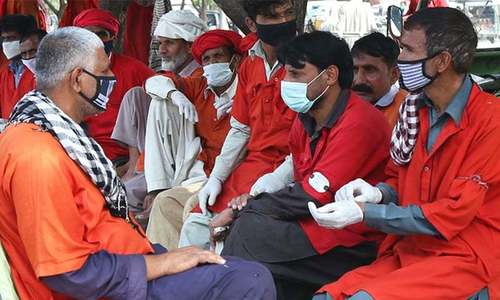ISLAMABAD: The government has called a special meeting of the Economic Coordination Committee (ECC) of the Cabinet on Monday (today) to clear the relief package announced by Prime Minister Imran Khan last week to minimise the adverse impact of the coronavirus outbreak on the country’s poor people and economy.
A senior government official told Dawn that the meeting of the ECC had been called with a single-point agenda of relief package that involved an additional fiscal impact of close to Rs550 billion on the federal budget. The meeting will be presided over by Adviser to the Prime Minister on Finance & Revenue Dr Abdul Hafeez Shaikh.
The official said the special ECC meeting had been called on Monday instead of its usual schedule on Wednesday so that the decision of additional fiscal burden could be endorsed by the federal cabinet on Tuesday and the benefit of fiscal measures start reaching the people within the current week.
He said the ruling party’s leadership had desired that provinces should be taken on board so that they design their relief activities on the basis of the federal government’s relief package in consultation with local administrations so that poor people could start receiving disbursements under the monthly income support programme.
The official said the ECC’s formal approval followed by the federal cabinet’s endorsement was mandatory for the federal government’s relief package. He explained that around Rs600bn worth of measures announced by the government last week were outside the federal budget or had been approved by various forums much before the consideration for the coronavirus-related support.
For example, he added, about Rs192bn income support was part of the federal budget announced in June last year, but about Rs144bn could not be utilised so far due to slow disbursements. These funds would now be utilised to provide Rs3,000 per month support to over a million beneficiaries.
Also, Rs280bn announced by the government as relief to farmers had already been approved by the ECC a few weeks ago for procurement of 8.2 million tonnes of wheat. Another Rs100bn amount actually belonged to exporters as tax refunds but has been withheld by the Federal Board of Revenue on one pretext or the other.
Likewise, the official explained that Rs70bn relief announced for petroleum products also did not require ECC’s approval as adjustments in petroleum levy and sales tax were in routine made by the ministry of finance and the FBR on a monthly basis.
The government had announced the total size of the relief package at Rs1.24 trillion to mitigate the impact of Covid-19 outbreak on the country’s economy and vulnerable segments of society.
Dr Shaikh had confirmed that the Benazir Income Support Programme’s (BISP) expenditure so far had amounted to about Rs50-60bn against an annual allocation of Rs192bn and now first priority would be to exhaust the allocation in full and then provide more funds, if required. The number of BISP beneficiaries would increase by 7 to 12 million for four months from its existing roll of 5 million.
Broad categories
The government has made three broad categories of the relief package, including Rs190bn emergency response, Rs570bn relief for citizens and Rs480bn support to business and economy.
The Rs190bn emergency response included Rs25bn for the National Disaster Management Authority (NDMA) to meet health and emergency relief needs, Rs50bn for providing facilities and incentives to health workers and Rs100bn emergency fund for evolving needs. Another Rs15bn fund is in the shape of elimination of all taxes (i.e. Customs duty, GST, WHT) on 61 essential health machinery, equipment and food items.
The Rs570bn relief fund for citizens included Rs200bn to protect jobs and incomes of industrial and business workers and daily wage earners. A mechanism would be developed in consultation with the business community and provincial governments for this purpose. Social security institutions and the Employees’ Old-Age Benefits Institution would also be utilised for the purpose.
Another Rs150bn relief fund would be for vulnerable families through the BISP and expansion of Panahgah network, Rs70bn in the shape of reduction in petroleum prices, Rs50bn additional support to Utility Stores to ensure supply of key kitchen items, like wheat, sugar, rice, cooking oil and pulses. Also, Rs100bn relief had been envisaged for electricity and gas consumers who use less than 300 electricity units in a month and have a monthly gas bill of less than Rs2,000.
Of the Rs480bn support to business and economy, the official said exporters would be released Rs100bn refunds of which Rs30bn (Rs10bn each under GST, duty drawback, DLTL) would be disbursed by the end of the current month. The State Bank of Pakistan has already announced a procedure for deferment of principal and interest due to the entire business community.
Another Rs100bn relief is in the shape of a gap in repayment of principal and interest and concessional loans to SMEs and cheaper fertiliser and other subsidies on agriculture.
Published in Dawn, March 30th, 2020














































